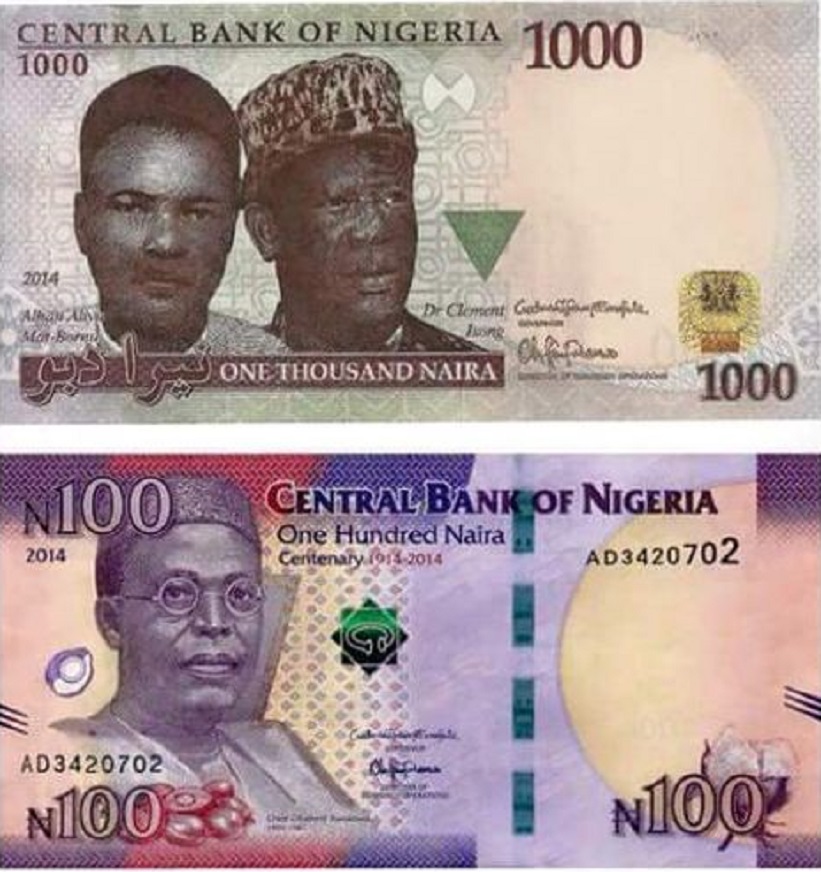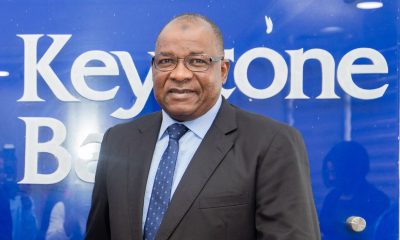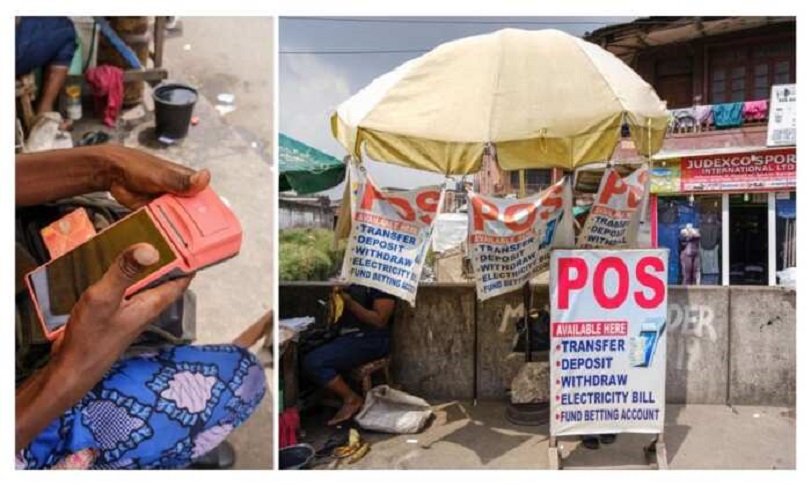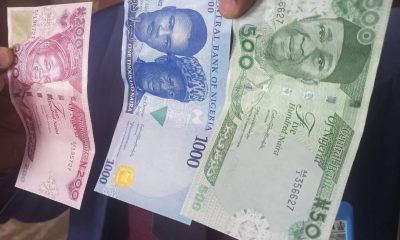Economy
Senator Suggests N100 as Highest Denomination in Circulation

By Aduragbemi Omiyale
The lawmaker representing Taraba Central Senatorial District at the National Assembly, Mr Yusuf Abubakar Yusuf, has said to curb corruption and prevent having a larger percentage of money in circulation in the hands of kidnappers and others, he would want the highest denomination in circulation in Nigeria to be N100, and not N1,000.
The Senator gave this submission at the plenary on Thursday during a debate on the new cashless policy of the Central Bank of Nigeria (CBN), which aims to make the highest cash withdrawal for individuals in a week N100,000 and N500,000 for corporate organisations.
On October 26, 2022, the Governor of the CBN, Mr Godwin Emefiele, informed newsmen that of the N3.2 trillion in circulation, about N2.7 trillion was not in the banks’ vaults, a development that prompted the apex bank to redesign the Naira, especially the N200, N500, and N1,000 denominations.
On November 23, 2022, President Muhammadu Buhari unveiled the new notes, and on December 15, 2022, they were officially introduced into the financial system, with banks giving out the new banknotes at over-the-counter (OTC) and ATMs, with N200 as the highest denomination from the machines from January 9, 2023.
While arguing on the new cash withdrawal limits yesterday, after several persons kicked against it, Mr Yusuf praised the CBN for the policy, saying it would curb corruption.
“When we are talking about cashless, we should be mindful that about N3.3 trillion in circulation, it’s only about a trillion naira that is in the bank. It is a danger to the country.
“Left to me, I would recommend the highest denomination to be N100. I so much support that we should go with the cashless policy in line with the present system that the CBN has adopted,” the lawmaker argued after Mr Uba Sani submitted a report of the Committee on Banking, Insurance and other Financial Institutions on the Implementation of Cashless Policy and the New Withdrawal Limits to the Senate.
Speaking on the report at the plenary presided over by the Deputy Senate President, Mr Ovie Omo-Agege, another Senator, Mr Ajibola Basiru, noted that, “The threshold that had been set is unrealistic to have any robust and meaningful life to our people.
“I am not oblivious to the fact that the committee has come up with recommendations. As a Committee of the Senate, we ought to have been alerted with certain indices to come up with recommendations on what should be the adjustment. I am suggesting that the threshold should be N500,000 for individuals per week.”
For Mr Orji Uzor Kalu, he backed the CBN for the policy but suggested that the limit should be N500,000 per day for individuals and N3 million per day for corporates, noting that this “will cover the fear of anybody.”
In her argument, Mrs Biodun Olujimi stated that, “When this issue came out, everyone that spoke on that day agreed on what the CBN was about to do.
“However, we were sceptical of certain issues contained in the proposal. The details were not clear to any of us. If there had been a consultation, we wouldn’t be where we are today. People would have gotten to know what is required of them and what is required of the CBN.
“The CBN approved POS operators and registered them and took money from them, and now those people can only do so little. It took all our unemployed graduates off the street. This policy will send them back to the streets.
“Why is this happening during an election period? Why is it that it is coming now? There is a need to be flexible in what we are doing now.”
Another contributor to the matter, Mr Adamu Aliero, stated that, “This report gives us an ideal picture of what the country should be but in reality, what is happening is different. The informal sector of the economy is very big, and it is not captured in the banking system.
“More people in the rural areas don’t go to the bank, and there is a need for sensitization and enlightenment in order to make this kind of people embrace the banking system.
“We have 774 Local Governments, and the bank covers only about 60% of these local government areas. It is difficult to really force these people to embrace banking culture. I support the idea of the cashless policy, but we should do it with caution.”
“I don’t think that anybody objects to the fact that a cashless society is what we need. My concern comes as a result of us being punitive.
“We must ensure that our society progresses, and those who make efforts to make an additional living should be encouraged. When you look at the measures CBN has put in their policy, to me, it appears punitive. I think in the global best practice, it doesn’t exist, so we don’t deter people from progressing,” the Senator from Anambra State, Ms Stella Oduah, submitted.
After taking inputs from more lawmakers, the Senate agreed that the central bank should considerably adjust the withdrawal limits in response to public outcry on the policy, with the committee tasked to embark on aggressive oversight of the bank on its commitment to flexible adjustment of the withdrawal limit and periodically report the outcome to the Senate.
Economy
NGX RegCo Cautions Investors on Recent Price Movements

By Aduragbemi Omiyale
The investing public has been advised to exercise due diligence before trading stocks on the Nigerian Exchange (NGX) Limited.
This caution was given by the NGX Regulation Limited (NGX RegCo), the independent regulatory arm of the NGX Group Plc.
The advisory became necessary in response to notable price movements observed in the shares of certain listed companies over recent trading sessions.
On Monday, the bourse suspended trading in the shares of newly-listed Zichis Agro-allied Industries Plc. The company’s stocks gained almost 900 per cent within a month of its listing on Customs Street.
In a statement today, NGX RegCo urged investors to avoid speculative trading based on unverified information and to consult licensed intermediaries such as stockbrokers or investment advisers when needed.
It explained that its advisory is part of its standard market surveillance functions, as it serves as a measured reminder for investors to prioritise informed and disciplined decision-making.
The notice emphasised that the Exchange will continue to monitor market activities closely in line with its mandate to ensure a fair, orderly, and transparent market.
“NGX RegCo encourages all investors to base their decisions on publicly available information, including a thorough assessment of company fundamentals, financial performance, and risk profile,” a part of the disclosure said.
It reassured all stakeholders that the NGX remains stable, well-regulated, and resilient, saying the platform continues to foster an environment where investors can participate with confidence, supported by robust oversight and transparent market operations.
“Our primary responsibility is to maintain a level playing field where market participants can trade with confidence, backed by timely and accurate information.
“This advisory is a routine communication, reinforcing that sound fundamentals, not speculation, remain the foundation for sustainable investment outcomes. We are fully committed to preserving the integrity and stability of our market,” the chief executive of NGX RegCo, Mr Olufemi Shobanjo, stated.
Economy
Stronger Taxpayer Confidence, Others Should Determine Tax Reform Success—Tegbe

By Modupe Gbadeyanka
The chairman of the National Tax Policy Implementation Committee (NTPIC), Mr Joseph Tegbe, has tasked the Nigeria Revenue Service (NRS) to measure the success of the new tax laws by higher voluntary compliance rates, lower administrative costs, fewer disputes, faster resolution cycles, and stronger taxpayer confidence.
Speaking at the 2026 Leadership Retreat of the agency, Mr Tegbe said, “Sustainable revenue performance is built on trust and efficiency, not enforcement intensity,” emphasising that the legitimacy and predictability of the system are more critical than punitive measures.
He underscored that the country’s tax reform journey is at a critical juncture where effective implementation will determine long-term fiscal outcomes.
The NTPIC chief stressed that tax policy must serve as an enabler of governance, and should embody simplicity, equity, predictability, and administrability at scale.
These principles, he explained, foster voluntary compliance, reduce operational friction, and strengthen investor confidence. He warned that ad-hoc adjustments or policy drift could undermine reform momentum, unsettle businesses, and deter investment, which thrives on predictable rules rather than shifting announcements. Structured sequencing, clear transition mechanisms, and continuous feedback between policymakers and administrators are therefore critical to sustaining reform credibility.
Mr Tegbe further argued that revenue reform cannot succeed in isolation. Achieving sustainable gains requires a whole-of-government approach, leveraging robust taxpayer identification systems, integrated financial data, efficient dispute resolution, and harmonised coordination across federal and sub-national levels. This approach, he said, reduces leakages, eliminates multiple taxation, and reinforces confidence in the system.
He noted that the passage of four new tax laws marks only the beginning of a broader reform agenda, describing the initiative as a systemic recalibration of Nigeria’s fiscal architecture, rather than a routine policy update.
He further asserted that the true measure of success will be the credibility of implementation, not the design of the laws themselves.
The NRS, he noted, functions as the nation’s “Revenue System Integrator,” with outcomes reflecting the strength of an interconnected ecosystem that encompasses policy clarity, enforcement consistency, digital infrastructure, dispute resolution efficiency, and intergovernmental coordination.
Economy
NUPENG Seeks Clarity on New Oil, Gas Executive Order

By Adedapo Adesanya
The National Union of Natural and Gas Workers (NUPENG) has expressed deep concern over the Executive Order by President Bola Tinubu mandating the Nigerian National Petroleum Company (NNPC) Limited to remit directly to the federation account.
In a statement signed by its president, Mr William Akporeha, over the weekend in Lagos, the union noted that the absence of detailed public engagement had naturally generated tension within the sector and heightened restiveness among workers, who are anxious to know how the new directive may affect their employment, welfare and job security, especially as it affects NNPC and other major operations in the oil and gas sector.
It pointed out that the industry remained the backbone of Nigeria’s economy, contributing significantly to national revenue, foreign exchange earnings, and employment.
The NUPENG president affirmed that any policy shift, particularly one introduced through an Executive Order, has far-reaching consequences for regulatory frameworks, Investment decisions, operational standards, and labour relations within the sector.
According to him, “there is an urgent need for clarity on the scope and objectives of the Executive Order -What precise reforms or adjustments does it introduce? “Its implications for the Petroleum Industry Act -Does the Order amend, interpret, or expand existing provisions under PIA?
“Impact on workers and existing labour agreements-Will it affect job security, conditions of service, Collective Bargaining agreements or ongoing restructuring processes within the industry? “Effects on indigenous participation and local content development -How will it affect Nigerian companies and employment opportunities for citizens?”
He warned that without proper consultation and explanation, misinterpretations of the Executive Order may spread across the industry, potentially destabilising operations and undermining industrial harmony that stakeholders have worked hard to sustain.
“Though our union remains committed to constructive engagement, national development and stability of the oil and gas sector, however, we are duty-bound and constitutionally bound to protect the rights and welfare and job security of our members whose livelihoods depend on a clear, fair and predictable policy framework,” Mr Akporeha further stated.
-

 Feature/OPED6 years ago
Feature/OPED6 years agoDavos was Different this year
-
Travel/Tourism10 years ago
Lagos Seals Western Lodge Hotel In Ikorodu
-

 Showbiz3 years ago
Showbiz3 years agoEstranged Lover Releases Videos of Empress Njamah Bathing
-

 Banking8 years ago
Banking8 years agoSort Codes of GTBank Branches in Nigeria
-

 Economy3 years ago
Economy3 years agoSubsidy Removal: CNG at N130 Per Litre Cheaper Than Petrol—IPMAN
-

 Banking3 years ago
Banking3 years agoSort Codes of UBA Branches in Nigeria
-

 Banking3 years ago
Banking3 years agoFirst Bank Announces Planned Downtime
-

 Sports3 years ago
Sports3 years agoHighest Paid Nigerian Footballer – How Much Do Nigerian Footballers Earn























